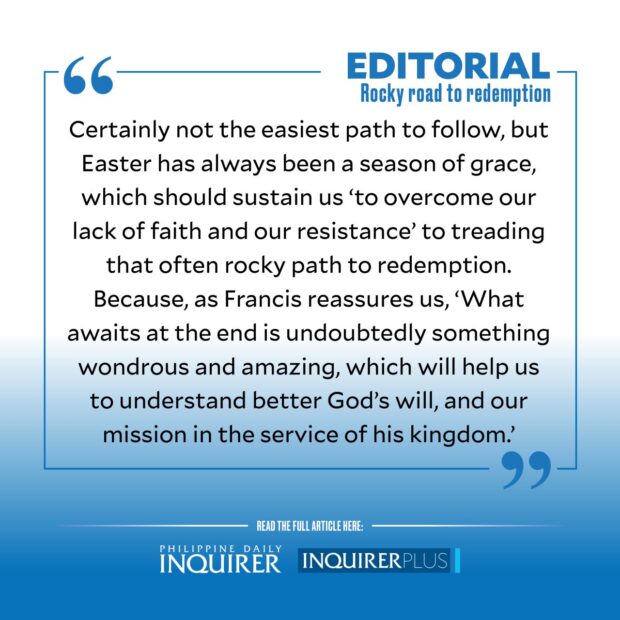Rough road to redemption
“Via Crucis,” or the Way of the Cross, might well describe the plight of Filipino nurses forced to leave home and family in search of better prospects abroad.
As Senate President Juan Miguel Zubiri noted, “Small private hospitals here pay nurses as low as P15,000 to P20,000 a month. Overseas, they earn somewhere around P150,000 to P200,000 a month. Our salaries and benefits offer no competition.” He added: “[Nurses too] are likely overworked, looking after more than their fair share of patients as more and more of their colleagues leave.” Already, there is a current shortage of 350,000 nurses, with the grim prospect of losing more of them if their pay and work conditions remain oppressive.
Article continues after this advertisementNot that the nurses’ precarious work situation is an isolated case. With an 8.6 percent inflation rate as of February, Ibon Foundation noted that the P570 minimum wage in the National Capital Region is barely half of the P1,161 living wage needed in the region. With Labor Day just three weeks away, the plight of workers comes to the fore once more, and it is not an edifying picture. While the Philippine Statistics Authority puts the unemployment rate at 4.8 percent in January 2023—markedly lower than the 6.4 percent recorded in the same month last year—the figure still translates to 2.37 million unemployed Filipinos.
Poverty and economic deprivation for most Filipinos thus loom large and real. In fact, noted former economics professor and president of the survey firm Social Weather Stations Mahar Mangahas, poverty in the Philippines is “dismal.”
In his seminar last week titled “138 surveys of Philippine poverty: 1983-2022” at the University of the Philippines School of Economics, Mangahas wrote in his Inquirer column that when it was first surveyed nationally in 1983, self-rated poverty was at 55 percent of households. Forty years since, in a survey conducted in the fourth quarter of 2022, it was 51 percent, or only four points less. Apparently, very little has changed over four decades. Among other “dismal” survey findings is that the food-poor are 34 percent of households, as of December 2022, with 41 percent or almost half of the poor lacking the education needed to earn a decent wage.
Article continues after this advertisementDespite the glowing figures touted by government, “[e]conomic growth is hardly helpful to the poor. On the other hand, consumer price inflation is very harmful to them,” Mangahas wrote.
But more than just showing how the poor’s economic standing has sunk, the survey also addresses a widely held “prejudice” among those from the middle and upper classes on why the poor have remained stuck in their sorry lot, Mangahas noted. Contrary to their thinking, “[t]here is survey evidence that the poor are not lazy. They do not fritter away ayuda into smoking, drinking, or gambling,” he said.
Just as damning is the survey finding that food, a basic need felt most keenly among the poor and their young children, “needs to be funded by a loan from the World Bank, rather than by the regular budget.” This, Mangahas said, reveals the low priority given by legislators to the poor.
While the survey findings are less than encouraging, and could well reflect the country’s continuing crucifixion as it is battered by a string of bad news in recent weeks — from a disastrous oil spill to a deadly ferry fire, the series of political killings, rising COVID and AIDS numbers, a shrinking agriculture sector, and the impending water crisis—the prospect of recovery and resurrection beckons. The Ombudsman’s suspension order on those involved in the overpriced pandemic supplies is a good start, and should soon be followed by the prosecution of errant parties in the oil spill, the ferry fire, the sugar import fiasco, the vegetable traders’ cartel, and human trafficking.
Such moves would validate Pope Francis’ reassuring message that Lent inevitably leads to Easter. “We need to set out on the journey, an uphill path that, like a mountain trek, requires effort, sacrifice, and concentration,” he said. Adding that redemption comes with faith, and with listening, the Pope seems to be addressing officials who turn away from the clamor of the poor for a better response to their plight: “Listen as [Jesus] speaks to us … through our brothers and sisters, especially in the faces and the stories of those who are in need … May [His] word not fall on deaf ears,” the Pope said. The rest of us are invited to ascend “a high mountain” in the company of Jesus, and “detach ourselves from mediocrity and vanity,” as the Holy Father puts it.
Certainly not the easiest path to follow, but Easter has always been a season of grace, which should sustain us “to overcome our lack of faith and our resistance” to treading that often rocky path to redemption. Because, as Francis reassures us, “What awaits at the end is undoubtedly something wondrous and amazing, which will help us to understand better God’s will, and our mission in the service of his kingdom.”

















